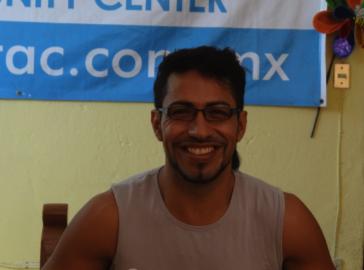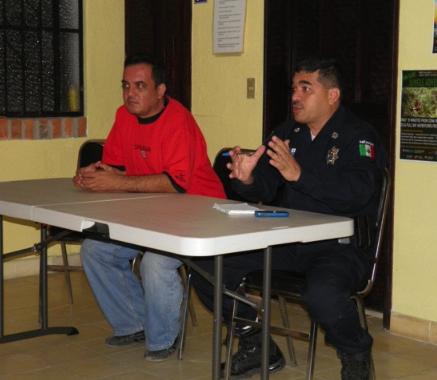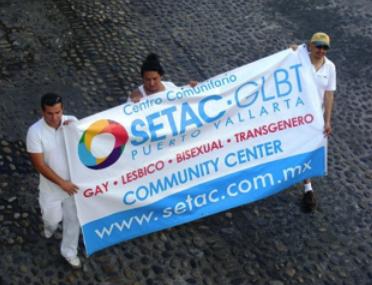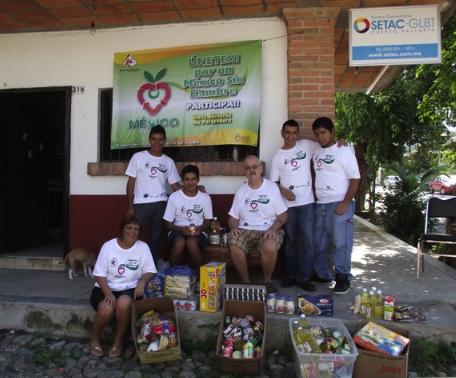
Saul Acevedo in the meeting room at SETAC. Credit: Keph Senett

President of the police advisory committee Hector Bettencourt (right) acts as liaison between police and the trans community at SETAC. Credit: Keph Senett

SETAC participates in the "Rally Against Homophobia," May 17, 2011. Credit: Keph Senett
Five years ago Saul Acevedo arrived in Puerto Vallarta a very scared and unhappy man. Fleeing violence in Cancun, Acevedo, who is a recovering alcoholic, had also just left rehab and learned that he is HIV-positive.
Things soon started to look up, however, after Acevedo met Ed Thomas at a local AA meeting.
Thomas is the founder of SETAC (Solidaridad Ed Thomas AC), a local community centre devoted to helping the city’s gay community.
Thomas invited Acevedo to visit SETAC, where Acevedo now volunteers, helping raise funds and create publicity. He also chairs Wednesday evening AA meetings. “I love it,” Acevedo says. “Every Wednesday I’m really excited to get up, even though I work nights. It’s my favourite day.”
He says being a part of SETAC gave him the confidence to get a job and change his life. He now works in public relations for a local martini lounge.
Thomas says Acevedo is one of many SETAC success stories.
“We look at Puerto Vallarta like it’s the San Francisco of Mexico, which it is,” Thomas explains. “When people in the United States grow up in, say, Iowa or Kansas or some little town, their whole life dream is ‘When I’m old enough I’m going to move to San Francisco, to get out of here, to be gay, to be able to be accepted.’ The children in Mexico have the same idea.”
Yet despite Vallarta’s reputation as a gay haven, until recently there were no targeted queer services available. Local gay and trans people have also faced violence, discrimination and harassment, even in Mexico’s gay mecca. And while people with AIDS and HIV could get medication through COESIDA, the state of Jalisco’s council for AIDS prevention, there were no counselling, community, education or support services for the area’s gay communities.
In 2009, when SETAC opened, it became the only full-service facility in the country.
“There are other specialized centres throughout Mexico,” SETAC director Paco Arjona explains, “but they focus on one agenda only. We serve the complete needs and wants of our members.”
This means English and computer classes, condom distribution, HIV testing, referrals, advocacy and acupuncture – all offered free of charge. SETAC also offers counselling services and groups like AA.
From January to November 2011, the centre hosted nearly 1,500 visitors, or around 140 people per month, the majority of whom were seeking information and HIV testing.
“Puerto Vallarta is known for sex tourism, which is why it’s one of the number one gay male vacation destinations in the world,” Thomas says. “And sometimes what happens is . . . somebody will say, ‘Well, for another 100 pesos or 50 pesos, let’s have unprotected sex’ and they do it – it’s just . . . poverty is a killer, and people really underestimate that.”
The problem is not confined to the gay community.
“We have a main issue here: men who have sex with men [MSM],” Arjona elaborates. “They don’t identify as gay. It brings up a lot of issues because sexual tourism here in Puerto Vallarta [can be lucrative]. They need money. They offer themselves and then they go to the family – their wife – and they are infected . . . and in some cases when the mother goes to get the HIV test, she might be pregnant and the baby is infected. And the mother doesn’t know why. That’s three people infected.”
While Mexico’s overall HIV prevalence is one of the lowest in Latin America, rates skyrockets among MSM and the gay community. A 2007 study found that 25 percent of MSM in Puerto Vallarta are HIV-positive. Men account for 77 percent of new cases in the country.
Prevention efforts are further frustrated by a culture of sexual secrecy that makes disclosure unthinkable, and by the local and federal governments. “[Government party] PAN is run by the church and is the one that’s running the state now . . . We try to give condoms to anybody who needs them. They say that we’re encouraging sex.”
“Encouraging” may be too strong a word, but SETAC is committed to a non-judgmental approach. “If you want to be a sex worker, be a sex worker,” Thomas says, explaining the centre’s position. “But be a safe and clean one. Come here and get tested. Come here and get the condoms. And don’t have unprotected sex.”
Arjona agrees, noting that SETAC is not focusing on prevention and has revised its mission statement for 2012.
“We’re trying to do detection . . . because having the HIV clinic in Puerto Vallarta – CAPASITS – they can get insurance from the government and they get free medication, and all services. [SETAC users] want more help and information and support on the HIV and AIDS issue, and STDs in general, so we are moving more in that direction.”
It’s a pragmatic move, according to Thomas and Arjona, based on the lessons of their first year and a half of operation, but the shift doesn’t mean an exclusive focus on HIV.
For members of the community like Acevedo, the variety of outreach and assistance found at SETAC is vital.
“I don’t really have a problem with the HIV stuff now,” Acevedo says. “With the HIV, you take a pill. With the alcohol and addiction, it’s serious. I could die.”
Support services are essential to SETAC’s members. “In Mexico we have different values than other countries,” explains Arjona. “The main thing for us is family . . . and then religion. [You] always want to please your family because you’re the man. They expect from you more than just growing.
“[As a gay man] everything’s a sin, because of religion. You’re not right, it’s against this, against that. And your family? It’s ‘don’t ask, don’t tell.’ They don’t want to hear it. They prefer you say good-bye to them.”
When Acevedo meets someone who is newly out or newly diagnosed with HIV, he sends them to SETAC. “If somebody has HIV I don’t send them to CAPASITS. I send them here first. When you come here, they’re not doctors. They’re people.
“Coming to the centre was the best thing I could ever do . . . Thank God I found it. Thank God it was here.”

 Why you can trust Xtra
Why you can trust Xtra


